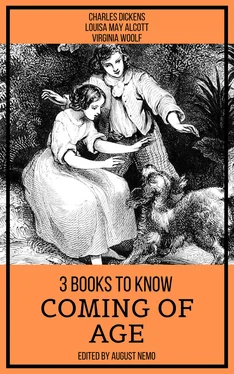"Mr. Jaggers is your guardian, I understand?" he went on.
"Yes."
"You know he is Miss Havisham's man of business and solicitor, and has her confidence when nobody else has?"
This was bringing me (I felt) towards dangerous ground. I answered with a constraint I made no attempt to disguise, that I had seen Mr. Jaggers in Miss Havisham's house on the very day of our combat, but never at any other time, and that I believed he had no recollection of having ever seen me there.
"He was so obliging as to suggest my father for your tutor, and he called on my father to propose it. Of course he knew about my father from his connexion with Miss Havisham. My father is Miss Havisham's cousin; not that that implies familiar intercourse between them, for he is a bad courtier and will not propitiate her."
Herbert Pocket had a frank and easy way with him that was very taking. I had never seen any one then, and I have never seen any one since, who more strongly expressed to me, in every look and tone, a natural incapacity to do anything secret and mean. There was something wonderfully hopeful about his general air, and something that at the same time whispered to me he would never be very successful or rich. I don't know how this was. I became imbued with the notion on that first occasion before we sat down to dinner, but I cannot define by what means.
He was still a pale young gentleman, and had a certain conquered languor about him in the midst of his spirits and briskness, that did not seem indicative of natural strength. He had not a handsome face, but it was better than handsome: being extremely amiable and cheerful. His figure was a little ungainly, as in the days when my knuckles had taken such liberties with it, but it looked as if it would always be light and young. Whether Mr. Trabb's local work would have sat more gracefully on him than on me, may be a question; but I am conscious that he carried off his rather old clothes, much better than I carried off my new suit.
As he was so communicative, I felt that reserve on my part would be a bad return unsuited to our years. I therefore told him my small story, and laid stress on my being forbidden to inquire who my benefactor was. I further mentioned that as I had been brought up a blacksmith in a country place, and knew very little of the ways of politeness, I would take it as a great kindness in him if he would give me a hint whenever he saw me at a loss or going wrong.
"With pleasure," said he, "though I venture to prophesy that you'll want very few hints. I dare say we shall be often together, and I should like to banish any needless restraint between us. Will you do me the favour to begin at once to call me by my Christian name, Herbert?"
I thanked him, and said I would. I informed him in exchange that my Christian name was Philip.
"I don't take to Philip," said he, smiling, "for it sounds like a moral boy out of the spelling-book, who was so lazy that he fell into a pond, or so fat that he couldn't see out of his eyes, or so avaricious that he locked up his cake till the mice ate it, or so determined to go a bird's-nesting that he got himself eaten by bears who lived handy in the neighbourhood. I tell you what I should like. We are so harmonious, and you have been a blacksmith—would you mind it?"
"I shouldn't mind anything that you propose," I answered, "but I don't understand you."
"Would you mind Handel for a familiar name? There's a charming piece of music by Handel, called the Harmonious Blacksmith."
"I should like it very much."
"Then, my dear Handel," said he, turning round as the door opened, "here is the dinner, and I must beg of you to take the top of the table, because the dinner is of your providing."
This I would not hear of, so he took the top, and I faced him. It was a nice little dinner—seemed to me then, a very Lord Mayor's Feast—and it acquired additional relish from being eaten under those independent circumstances, with no old people by, and with London all around us. This again was heightened by a certain gipsy character that set the banquet off; for, while the table was, as Mr. Pumblechook might have said, the lap of luxury—being entirely furnished forth from the coffee-house—the circumjacent region of sitting-room was of a comparatively pastureless and shifty character: imposing on the waiter the wandering habits of putting the covers on the floor (where he fell over them), the melted butter in the armchair, the bread on the bookshelves, the cheese in the coalscuttle, and the boiled fowl into my bed in the next room—where I found much of its parsley and butter in a state of congelation when I retired for the night. All this made the feast delightful, and when the waiter was not there to watch me, my pleasure was without alloy.
We had made some progress in the dinner, when I reminded Herbert of his promise to tell me about Miss Havisham.
"True," he replied. "I'll redeem it at once. Let me introduce the topic, Handel, by mentioning that in London it is not the custom to put the knife in the mouth—for fear of accidents—and that while the fork is reserved for that use, it is not put further in than necessary. It is scarcely worth mentioning, only it's as well to do as other people do. Also, the spoon is not generally used over-hand, but under. This has two advantages. You get at your mouth better (which after all is the object), and you save a good deal of the attitude of opening oysters, on the part of the right elbow."
He offered these friendly suggestions in such a lively way, that we both laughed and I scarcely blushed.
"Now," he pursued, "concerning Miss Havisham. Miss Havisham, you must know, was a spoilt child. Her mother died when she was a baby, and her father denied her nothing. Her father was a country gentleman down in your part of the world, and was a brewer. I don't know why it should be a crack thing to be a brewer; but it is indisputable that while you cannot possibly be genteel and bake, you may be as genteel as never was and brew. You see it every day."
"Yet a gentleman may not keep a public-house; may he?" said I.
"Not on any account," returned Herbert; "but a public-house may keep a gentleman. Well! Mr. Havisham was very rich and very proud. So was his daughter."
"Miss Havisham was an only child?" I hazarded.
"Stop a moment, I am coming to that. No, she was not an only child; she had a half-brother. Her father privately married again—his cook, I rather think."
"I thought he was proud," said I.
"My good Handel, so he was. He married his second wife privately, because he was proud, and in course of time she died. When she was dead, I apprehend he first told his daughter what he had done, and then the son became a part of the family, residing in the house you are acquainted with. As the son grew a young man, he turned out riotous, extravagant, undutiful—altogether bad. At last his father disinherited him; but he softened when he was dying, and left him well off, though not nearly so well off as Miss Havisham. Take another glass of wine, and excuse my mentioning that society as a body does not expect one to be so strictly conscientious in emptying one's glass, as to turn it bottom upwards with the rim on one's nose."
I had been doing this, in an excess of attention to his recital. I thanked him, and apologized. He said, "Not at all," and resumed.
"Miss Havisham was now an heiress, and you may suppose was looked after as a great match. Her half-brother had now ample means again, but what with debts and what with new madness wasted them most fearfully again. There were stronger differences between him and her, than there had been between him and his father, and it is suspected that he cherished a deep and mortal grudge against her, as having influenced the father's anger. Now, I come to the cruel part of the story—merely breaking off, my dear Handel, to remark that a dinner-napkin will not go into a tumbler."
Читать дальше












